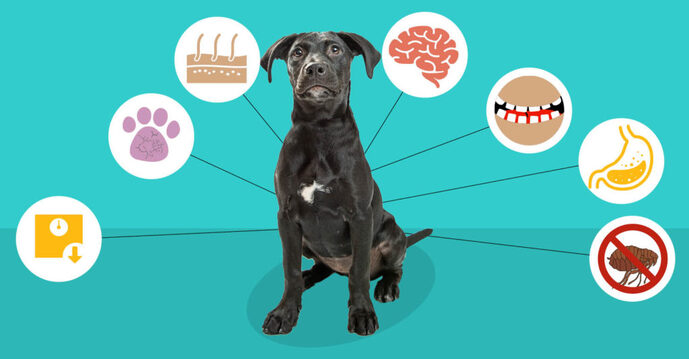|
Introduction
When it comes to food allergies, pets are not too different from humans. Although they are less common, around 10% of dogs and 13% of cats have food allergies. The most common allergies in pets stem from beef, chicken, dairy, and fish. They could be caused by both genetic predispositions and environmental effects, especially if they were exposed to antibiotics at an early age. Pets cannot develop allergies for foods they have not been exposed to. As they are less common, many people do not know what to do when their pet has an allergic reaction to the food they eat, but worry not! Symptoms The most common symptoms for dogs include chronic ear inflammation, gastrointestinal problems (including diarrhea, constipation, and vomitting), and anal fissures or itches. Cats display many of the same symptoms, but are much more prone to itchy skin, which can lead to wounds. In less common pets such as hamsters or other rodents, violent bursts of sneezing has been observed. These symptoms occur almost immediately after the pet has eaten something that it should not have. They may sometimes subside on their own, but most likely require some form of medical attention. Treatment Options As with most people, allergies last for a lifetime in pets. The best options for relieving your pet of its allergies is to simply not feed them the food that makes them allergic, and avoid dog and cat food packets that may induce allergies. Making your pet go vegetarian is not recommended, as it deprives your pet of the essential nutrients it needs. If your dog or cat were to have an allergic reaction to any of the food it eats, be sure to give it the proper medication. Antihistamines (excluding OTC) are known to work especially well. Sentry and Petlab are renowned for their medications for pet allergies. If they are not available, most over the counter medicine in moderation is known to work as well. This includes Claritin, Benadryl, and Zyrtec. Avoid Tylenol and Ibuprofen, as they are not safe for pets. If the condition of your pet gets worse, be sure to visit your vet. Allergy Friendly Options There are many companies that provide allergy friendly pet food. With any pet food, however, make sure to read the labels and nutritional facts. Here are a few companies can try:
For more information on OTC medications for pet allergies, you can visit https://yourdogadvisor.com/otc-pain-meds-for-dogs/ By: Shravya Harish
0 Comments
Leave a Reply. |
Details
Archives
May 2021
Categories |
Powered by
 Create your own unique website with customizable templates.
Create your own unique website with customizable templates.
 Create your own unique website with customizable templates.
Create your own unique website with customizable templates.


 RSS Feed
RSS Feed